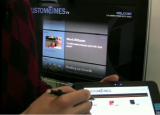In the last couple of weeks, we’ve seen significantly more people reporting they’ve seen AdWords that allow advertisers to collect email addresses directly in the ad unit. Now Google has confirmed it has expanded the trial of the lead generation format to additional advertisers.
We’ve seen the format used by daily deal provider bloomspot, which also collected ZIP codes via the form, presumably to add subscribers to the appropriate city-specific deals newsletters. Email service providers like AWeber and Vertical Response also seem to be trying out the format. Previous versions of the test included the ability for users to request phone calls from marketers, as well.
A Google spokesperson sent a statement reading: “This ad format is still in testing phase, but our team is getting a lot of interest from advertisers and we’ve been slowly expanding the trial over recent months. These ads help businesses gather new leads and enable users to easily get relevant information and ask for quotes.”
Indeed, the format seems designed for marketers peddling high-consideration goods or services, which often require significant nurturing and follow-up by a salesperson. On the consumer side, one could seem them being useful for car manufacturers and retailers, and business-to-business leads seem a natural use case
The New York Times Company Research & Development Lab works to innovate around new technologies, anticipating consumer behaviors and building new interfaces for news
From the creators of the Twitterverse 2.0

The Federal Trade Commission is considering proposing a do-not-track mechanism that would allow consumers to easily opt out of all behavioral targeting, chairman Jon Leibowitz told lawmakers on Tuesday.
Testifying at a hearing about online privacy, Leibowitz said the FTC is exploring the feasibility of a browser plug-in that would store users' targeting preferences. He added that either the FTC or a private group could run the system.
Leibowitz said that while Web users on a no-tracking list would still receive online ads, those ads wouldn't be targeted based on sites that users had visited in the past.
Three years ago, a coalition of privacy groups including the World Privacy Forum, Center for Digital Democracy and Center for Democracy & Technology proposed that the FTC create a do-not-track registry, similar to the do-not-call registry. At the time, the online ad industry strongly opposed the idea of a government-run no-tracking list.
Currently, many people who want to opt out do so through cookies, either on a company-by-company basis or through the Network Advertising Initiative's opt-out cookie (which allows users to opt out of targeting from many of the largest companies). But those opt-outs aren't stable because they're tied to cookies, which often get deleted.
The Network Advertising Initiative recently rolled out a browser plug-in that enables consumers to opt out of targeted ads by NAI members.
Leibowitz also told lawmakers that he personally favored opt-in consent to behavioral targeting, or receiving ads based on sites visited. "I think opt-in generally protects consumers' privacy better than opt-out, under most circumstances," he said. "I don't think it undermines a company's ability to get the information it needs to advertise back to consumers."
Online ad companies say that behavioral targeting is "anonymous" because they don't collect users' names or other so-called personally identifiable information, but Leibowitz said that it might be possible to piece together users' names from clickstream data. He told lawmakers about AOL's "Data Valdez," which involved AOL releasing three months' of "anonymized" search queries for 650,000 users. Even though the company didn't directly tie the queries to users' names, some were identified based solely on the patterns in their search queries. Several lawmakers expressed concerns with behavioral advertising during Tuesday's hearing. Sen. Claire McCaskill (D-Mo.) said she was "a little spooked out" about online tracking and ad targeting.
McCaskill said that after reading online about foreign SUVs, she noticed that she was receiving ads for such cars. "That's creepy," she said, likening it to someone following her with a camera and recording her moves.
She added that if an "average American" were to learn that someone was trailing him around stores with a camera, "there would be a hue and cry in this country that would be unprecedented."
Sen. Jay Rockefeller (D-W. Va.) and Sen. John Kerry (D-Mass.) both expressed concern that privacy policies weren't giving Web users enough useful information about online ad practices.
Rockefeller proposed that some companies were burying too much information in lengthy documents that consumers don't read. "Some would say the fine print is there and it's not our fault you didn't read it," he said, adding, "I say, that's a 19th-century mentality."
Kerry added that he didn't know that consumers understood how companies use data. "I'm not sure that there's knowledge in the caveat emptor component of this," he said.







